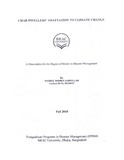| dc.contributor.advisor | Rahman, Rezaur | |
| dc.contributor.author | Saifullah, Nasrul Momen | |
| dc.date.accessioned | 2011-10-20T03:49:22Z | |
| dc.date.available | 2011-10-20T03:49:22Z | |
| dc.date.copyright | 2010 | |
| dc.date.issued | 2010-09 | |
| dc.identifier.other | ID 09268005 | |
| dc.identifier.uri | http://hdl.handle.net/10361/1403 | |
| dc.description | This dissertation is submitted in partial fulfillment of the requirements for the degree of Master in Disaster Management, 2010. | |
| dc.description | Cataloged from PDF version of Dissertation. | |
| dc.description | Includes bibliographical references (page 54 - 57). | |
| dc.description.abstract | Climate disaster like flood, river erosion puts a lot of pressure especially on char dweller's whose responsibility is to remain together as family and earn subsistence in day to day life. The main objective of this research in identifying the perception of char dwellers regarding their livelihood option and their capacity to cope with climate change and prioritize the adaptation option for reducing their vulnerability. Kazipur upazila in Sirajganj district was selected as research area due to flood proneness of the area and char dweller's vulnerability to climate changes in agricultural and livestock sectors. A pre tested questionnaire was used to interview 50 respondents to elicit the perception of char dweller's regarding climate change and their preferred adaptation options.
An insignificant section of respondent had observation on extra water level rise and appreciation about high temperature. Majority of the respondents mentioned (78%) flood as natural process. To overcome the natural disaster in char areas they change crop patterns with seasons, select time of cultivation after prediction of natural disaster and to survive and earn livelihood they also select occupation with season.They cultivate mostly Boro and Rabi paddy during January to June. Most of the respondents mentioned about their reduced livelihood options, suffer from different types of diseases, earning loss, taking loan with high interest and losing house hold asset as the impacts of natural disaster exacerbated by the erratic behavior of climate. They also mentioned that they need to migrate (90%), loss of their and cattle's food (80%), become poor (80%) and interrupt education (96%) as a result of flood. The respondents mostly used pond and river water (42%) for daily uses.For drinking purposes they also used (40%) tube well. They mentioned the following options to adapt with the climate change. They changed their crop pattern(80%), need place to stay during flood, cyclone etc natural disasters (80%), need high land to preserve livestock (86%), temporary income options needed (70%),need clean water supply (90%). The conducted study tried to capture a snapshot of how climate change is already affecting people living in poverty. Finally,adaptation options are urgently needed for the reducing Char Dweller's vulnerability. | en_US |
| dc.description.statementofresponsibility | Nasrul Momen Saifullah | |
| dc.format.extent | 57 pages | |
| dc.language.iso | en | en_US |
| dc.publisher | BRAC University | en_US |
| dc.rights | BRAC University dissertation are protected by copyright. They may be viewed from this source for any purpose, but reproduction or distribution in any format is prohibited without written permission. | |
| dc.subject | Disaster management | |
| dc.subject | Char dweller | |
| dc.subject | Climate change | |
| dc.title | Char dwellers' adaptation to climate change | en_US |
| dc.type | Dissertation | en_US |
| dc.contributor.department | Department of Architecture, BRAC University | |
| dc.description.degree | M. Disaster Management | |

